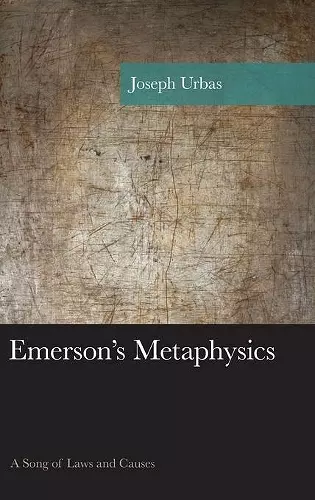Emerson's Metaphysics
A Song of Laws and Causes
Format:Hardback
Publisher:Lexington Books
Published:12th Oct '16
Currently unavailable, and unfortunately no date known when it will be back
This hardback is available in another edition too:
- Paperback£39.00(9781498524520)

This book gives the first complete, fully historicized account of Emerson's metaphysics of cause and effect and its foundational position in his philosophy as a whole. Urbas tells the story of the making of a metaphysician and in so doing breaks with the postmodern, anti-metaphysical readings that have dominated Emerson scholarship since his philosophical rehabilitation began in late 1970s. This is an intellectual biography of Emerson the metaphysician but also a chapter in the cultural life-story of a concept synonymous, in the Transcendentalist period, with life itself, the story of the principle at the origin of all being and change. Emerson's Metaphysics proposes an account of Emerson's metaphysical thought as it unfolds in his writings, as it informs his philosophy as a whole, and as it reflects the intellectual and religious culture in which he lived and moved and had his being. This book will be of interest to philosophers, literary scholars, and students of English, philosophy, and intellectual and religious history who are interested in Emerson and the American Transcendentalist movement.
In this captivating book, Joseph Urbas proposes a reconstruction of the metaphysics of the American poet, essayist, and self-defined philosopher Ralph Waldo Emerson.... The author provides an abundance of textual evidence to support his thesis. * The Pluralist *
In a perceptive and stimulating reappraisal, Joseph Urbas elucidates the concept of 'causation' as the 'dynamic, creative first principle' of Emerson’s philosophy. Restoring him to his place as a philosopher in an age searching for a new grounding of fundamental principles, Urbas shows Emerson as a surprisingly systematic thinker, whose 'first philosophy' sought to merge ontology with moral law. -- David M. Robinson, Oregon State University
Professor Urbas offers both a thoughtful and passionate defense of Emerson as a metaphysical thinker, and a wide-ranging exploration of a broad swathe of contemporary philosophical texts that situates him in a vital transatlantic perspective. This book will likely picture "a new Emerson" for many readers. -- Francois Specq, Ecole Normale Supérieure de Lyon
Urbas defends a new thesis about how Emerson’s metaphysics ought to be understood, both historically and in light of metaphysics as an on-going discipline. Emerson is a “causationist” in a special and difficult sense. This insight will lead to a reconsideration of other metaphysicians who were influenced by Emerson, such as Peirce and Dewey and Royce. The causationist interpretation will also open up new comparative work between Emerson and South Asian philosophies, including the traditional schools of Buddhism, which is timely for our age. -- Randall E. Auxier, Southern Illinois University
With Emerson’s Metaphysics we leave behind the “rehabilitation era” in Emerson studies. We can debate whether Emerson’s current standing as a philosopher benefited or not from a generation of scholarship focused on just the parts we liked: his skepticism, his individualism, his egalitarianism. But what can no longer be claimed—thanks to this book—is that any of these things mattered to Emerson more than his metaphysics. Peering deeply into the writings both of Emerson and of an astounding array of his contemporaries, Joseph Urbas proves that epistemology, ethics, and politics all followed—in Emerson’s view—from metaphysics. Causation, specifically, was Emerson’s “first philosophy,” as amply shown in this carefully researched and argued book. -- Daniel S. Malachuk, Western Illinois University
Deeply informed both by modern scholarship and by forgotten primary texts, and drawing on all of Emerson’s writings, this lively, comprehensive study clearly reconstructs Emerson’s metaphysics of causation, persuasively demonstrating its centrality to Emerson and his contemporaries. No one who studies Emerson, Transcendentalism, or nineteenth-century New England literary culture can afford to miss it. -- William Rossi, University of Oregon
Much of the best recent writing about Emerson emphasizes his skepticism, the instabilities of his philosophical positions, and his epistemology of moods. Yet it was Emerson himself who wrote that although “all moods may safely be tried” there is “an order which makes skepticism impossible.” Such metaphysical moments occur regularly in Emerson’s writings, and they are the opening for Joseph Urbas’s fine new book, in which he argues that an active living “Cause” is Emerson’s fundamental metaphysical principle. Urbas considers the entire range of Emerson’s writing, including his poetry, and places Emerson’s thought in the context of such influential predecessors as Samuel Taylor Coleridge and Victor Cousin, and his American contemporaries Mary Moody Emerson, William Ellery Channing, Margaret Fuller, and Bronson Alcott. Urbas’s challenging account, replete with careful and original readings and observations, is a valuable new contribution to the study of Emerson’s thought. -- Russell B. Goodman, Regents Professor, Emeritus, University of New Mexico
ISBN: 9781498524506
Dimensions: 239mm x 157mm x 26mm
Weight: 581g
272 pages